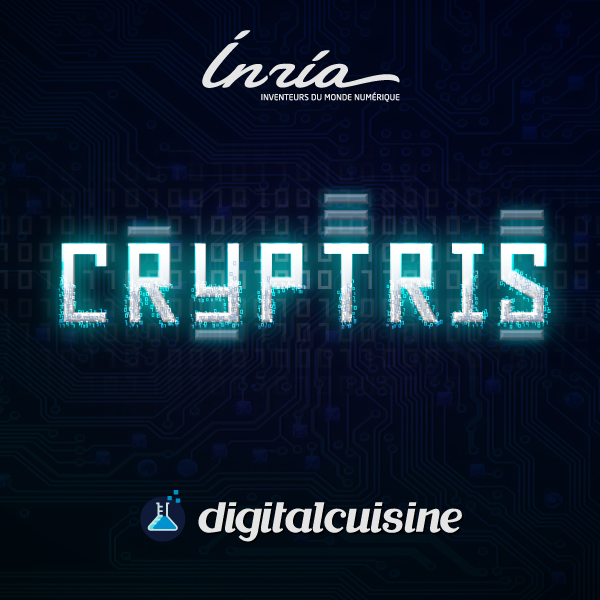Back to main page
Cryptris, a video game on cryptography
Cryptris is a project funded and directed by Inria (the French institute for research in CS) and developed Digitalcuisine as an effort to popularize the understanding and the enlighten use of Cryptography to preserve privacy of communications.
Follow this link to play !

Source code at https://github.com/InriaMecsci/cryptris
Update (translation)
To help the translation of the two popular science articles please follow those links :
https://cryptris.framapad.org/1
https://cryptris.framapad.org/2
To discuss the implementation of multilingual support for Cryptris, please use the bug-tracker on the github https://github.com/daformat/cryptris .
Merci !
Language
Unfortunately, the video game and associated contents are only available in French... for now. We would be very excited to see the video game translated to other languages. We would be extremely grateful for any help toward that goal. We see three ways to help:
- Help translate the text of the video game itself, and the text of popular sciences articles that goes with it. While we surely want to be part of that process, native English writers with scientific background could make our texts much more accessible to a broad audience.
- Help us code multilingual support. The source code is available on github; and could easily be branched.
- Sponsor/fund extra coding. If you identify yourself as a non-evil organization we would be glad to add your logo to our game in exchange for funding multilingual support; and why not extra features.
Theoretical background and Gameplay
The game aims to present the use and the underlying ideas of asymmetric cryptography; for that the player is presented with the private key that he must use to decrypt incoming messages (and save the world thanks to those messages !). An adversary intercepts the encrypted messages, but only has access to the public key (the key used for encryption but not efficient for decryption).
The mechanics of the game are "Tetris-like". The player manipulates blocks on the top and can make them fall. Blocks behaves as follows : similar color blocks stacks, while different colors blocks annihilate; in a column-wise fashion.
This mechanic was design to match addition of integer vectors; which brings math in Cryptris in a disguised way. In fact Cryptris mechanics are inspired by very recent advances in Cryptography: "lattice based cryptography". It is a candidate for quantum-resistant cryptography (recall that both RSA and discrete log would be broken by a quantum computer). It is also from this thanks to those Euclidian Lattices that cryptographers have unlocked the "grail" of cryptography, namely fully homomorphic encryption.
Together with the game, were published to articles (in French) introducing step by the the geometrical object of "point lattice", its relation to Cryptris, how private and public key are designed, and why it should be hard to break such a cryptosystem (relation to NP-completeness). Those articles have been published on the CNRS (French National institute for scientific research) popular science blog :
http://images.math.cnrs.fr/Cryptris-1-2-Comprendre-une-des.html
http://images.math.cnrs.fr/Cryptris-2-2-Les-dessous.html
Technology, Social Media... and privacy
The game was designed in HTML5/Javascript; and runs on most browsers, either on computers, tablets and smartphones. It runs smoothly on most configuration, except sometime on Linux+Firefox (but perfectly fine using chrominium).
The game can be shared on social medias (FB,Twitter,G+ and email); but does not require external login and does not store any user information. Sharing can be done in two ways; either sharing the main menu page; or sending a personalized "encrypted" challenges.
Full disclosure
The "encrypted challenges" should in no way be considered seriously encrypted. Cryptris is a simplified version of serious cryptography and should not be considered cryptographically secure (the key size is way too small for that...). Moreover the secret key is given to any other player clicking on the link. Such warning is displayed to the player before sharing, inviting him to use PGP for serious encryption/signatures.
Concerning tracking, the game contains social network buttons, and is followed by google analytics. This sometimes cause a bug while loading if you have adblock/ghostery plug-ins (stuck at 98%) which we hope to resolve soon-ish. Any help at a work-around would be appreciated.
Contacts
Thierry Vieville, Thierry.Vieville(at)inria.fr , Inria popular science department
Mathieu Jouhet, mathieu(at)digitalcuisine.fr , CEO of Digitalcusine
Leo Ducas, lducas(at)eng.ucsd.edu, game designer and scientific advisor
